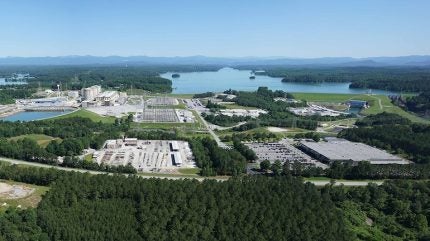
The US Nuclear Regulatory Commission (NRC) has renewed the operating licences for Duke Energy’s Oconee Nuclear Station for a further 20 years. The current licences for the Oconee reactors in South Carolina will expire in February 2033 for unit 1, October 2033 for unit 2; and July 2034, for unit 3. The licences now expire in February 2053 and October 2053, respectively, for units 1 and 2, and July 2054 for unit 3.
The Oconee Nuclear Station has a power output capacity of over 2,500 MWe from three Babcock & Wilcox pressurised water reactors. It is the only US NPP that does not use emergency diesel generators. Instead, it relies on two hydroelectric units at the nearby Keowee hydroelectric station. If both Keowee units are out of service, emergency power can alternatively be provided by combustion turbines at the nearby Lee fossil generating station.
Oconee is the first of Duke Energy’s nuclear facilities to receive approval to operate for 80 years. Duke Energy is working toward extending the life of all of its existing nuclear units, with plans to submit a licence renewal application for Robinson Nuclear Plant in Hartsville.
At Oconee, Duke Energy has replaced its reactor vessel heads, steam generators, turbines, transformers, pumps, valves and other equipment to support longevity. In 2024, Oconee added a combined 45 megawatts by implementing power uprate improvement projects on all three units.
“Approval to extend Oconee Nuclear Station’s licences is a significant milestone for Duke Energy and provides significant learnings to use in completing licence applications for our other plants,” said Duke Energy Chief Nuclear Officer Kelvin Henderson. “As we address growth, modernise the fleet and invest in cleaner technologies, subsequent licence renewal helps ensure nuclear energy continues to be a vital part of Duke Energy’s generation portfolio.”
Oconee’s 4,000-page application – compiled years ahead of schedule – underwent rigorous scrutiny before earning approval. Advances in technology have streamlined some aspects of the process; drones can perform inspections that people once climbed ladders to do, but relicensing remains a labour-intensive effort.
NRC said its review of the application proceeded on two tracks: a safety evaluation report was issued in December 2022, and a final environmental impact statement was issued in February 2025.
Duke Energy operates nuclear reactors at six sites in North and South Carolina: the three-unit Oconee plant, two-unit plants at Brunswick, Catawba and McGuire; and two single-unit plants at Robinson and Shearon Harris. In 2024, its six plants provided more than 50% of Carolina customers’ electricity and more than 96% of the company’s clean energy. Keeping its nuclear fleet operating is seen by Duke as key to achieving its carbon reduction goals of at least 50% by 2030 and net-zero by 2050 from electricity generation.






